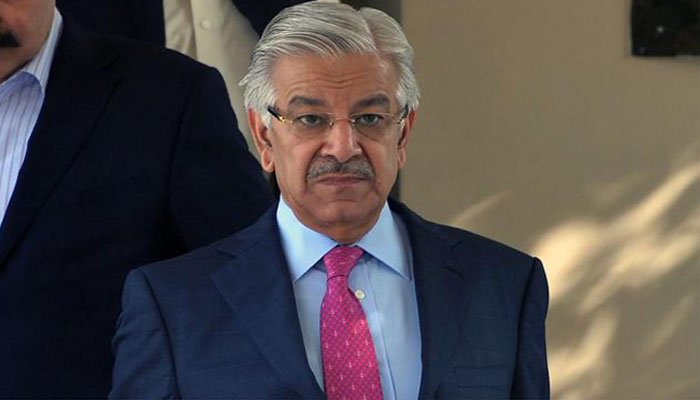Authors: Jordan

ISLAMABAD: The Supreme Court will hear former foreign minister Khawaja Asif’s petition challenging the order of Islamabad High Court which disqualified him as member of the Parliamentarian for not being honest, concealing his employment in UAE based company as well as his monthly salary.
Last week, an IHC three-member bench headed by Justice Athar Minallah, disqualified Khawaja Asif under Article 62 (1)(f) of the Constitution for failing to disclose his employment in a UAE company and the monthly salary he was drawing.
The court had disqualified Khawaja Asif on the petition, filed by Pakistan Tehreek-e-Insaf (PTI) leader Usman Dar, alleging that the former foreign minister had not disclosed in his nomination papers for 2013 general elections, his employment in a UAE company and monthly salary.
The court had held that the former foreign minister was not qualified to contest the 2013 general elections from NA-110 as he did not fulfil the conditions described under Article 62(1)(f) of the Constitution, read with Section 99(1)(f) of the Representation of People’s Act 1976.
On Wednesday, Khwaja Asif filed a petition for leave to appeal under Article 185(3) of the Constitution against the IHC judgment.
He prayed to the apex court to set aside the IHC judgment as well as the notification of Election Commission of Pakistan, de-notifying him as member of the National Assembly from NA-110 Silakot.
In his petition, Khwaja Asif contended that the IHC erred in holding, “It is obvious form the facts and circumstances in the instant case that the respondent (Asif) had deliberately and willfully not disclosed his status as an employee of the company, nor receiving the salary pursuant thereto, however, Khawaja Asif claimed that he had made full disclosure in his nomination form as required under Representation of People’s Act (ROPA).
“The obligation under the nomination form under S 12 of ROPA was to provide the statement of assets and liabilities as they stood on June 30, 2012 and which the present petitioner did so honestly”, Khawaja Asif submitted.
The former foreign minister further contended when the requirement in law was to disclose assets and liabilities, which he did so honestly and even the salary of AED9000 was plainly recorded in the tax returns filed with the nomination papers and even the Iqama clearly recorded the name of the employer.
“In the face of such disclosures, there was no basis for the IHC to conclude that he did not fulfill the conditions of Article 62(1)(f) of the Constitution read with section 99(1)(f) of ROPA”, Khawaja Asif claimed.
He further contended that in the facts and circumstances of the case, the use of the term ‘business’ while answering ‘occupation’ did not necessarily imply suppression or concealment of employment.
The former foreign minister submitted that IHC was not justified in concluding “lack of honesty” in relation to the non-disclosure of the dormant bank account, adding that in relation to the non-disclosure of the dormant bank account, the IHC bench had gone beyond the pleadings of the petitioner.
He further contended that the Supreme Court in case of Muhammad Hanif Abbasi verses Jehnagir Khan Tareen PLD 2018 SC 114 had meticulously laid down the benchmark for the exercise of quo warranto jurisdiction stating that the power of quo warranto in relation to parliamentarians could validly be exercised by the courts of the disqualification attributed to them had direct and close nexus to corruption whereas the words corrupt, corruption or corrupt practices do not even find mention in the entire memo of the petition filed by Usman Dar before the IHC.
“Thus, there was no justification for the IHC to exercise quo warranto jurisdiction on the plea of a person who had come before it with soiled and unclean hands suppressing material information”, Khawaja Asif submitted.
He prayed to the apex court to set aside the IHC judgment as well as the notification of Election Commission of Pakistan, de-notifying him as member of the National Assembly from NA-110 Silakot.

 11
11




